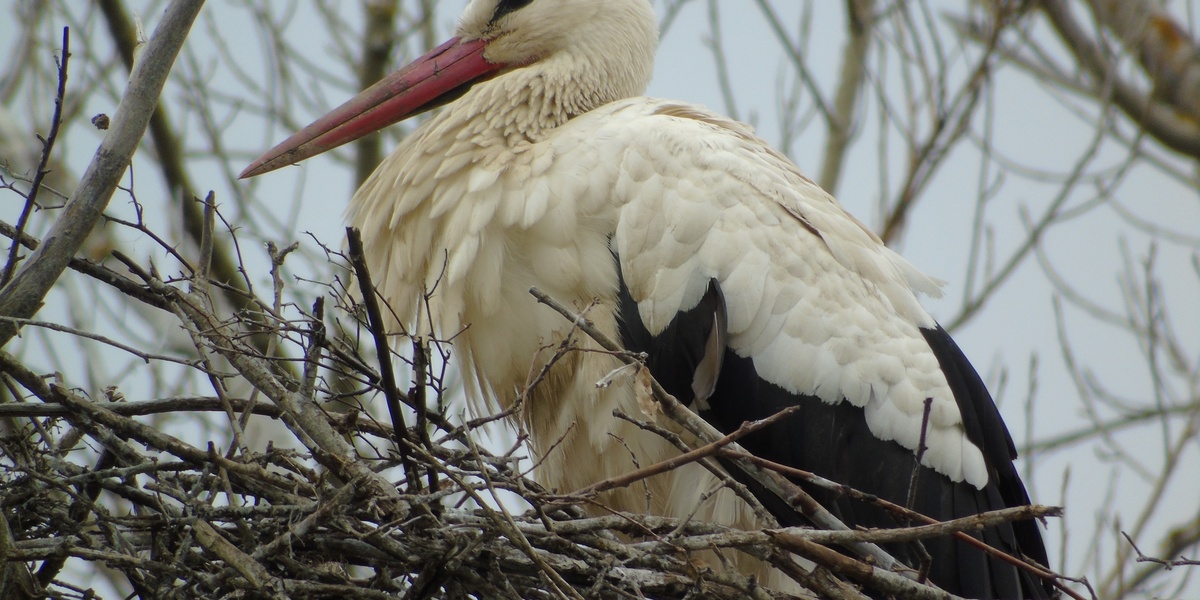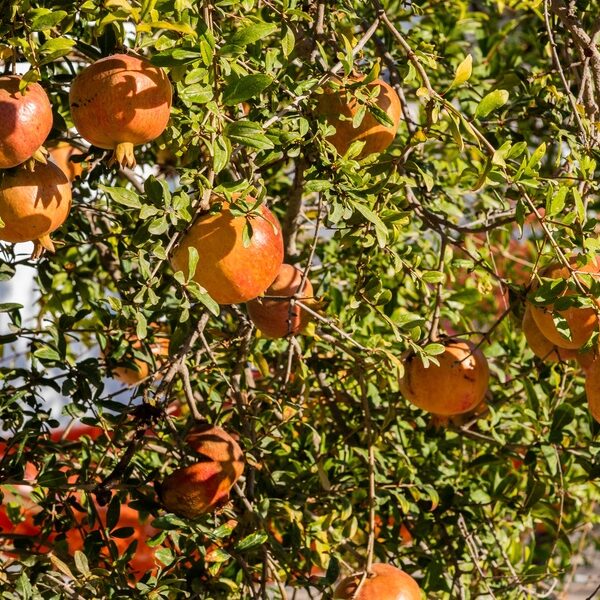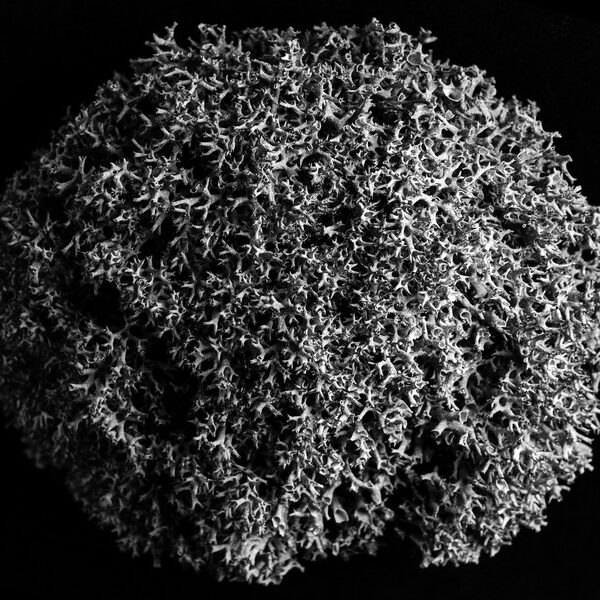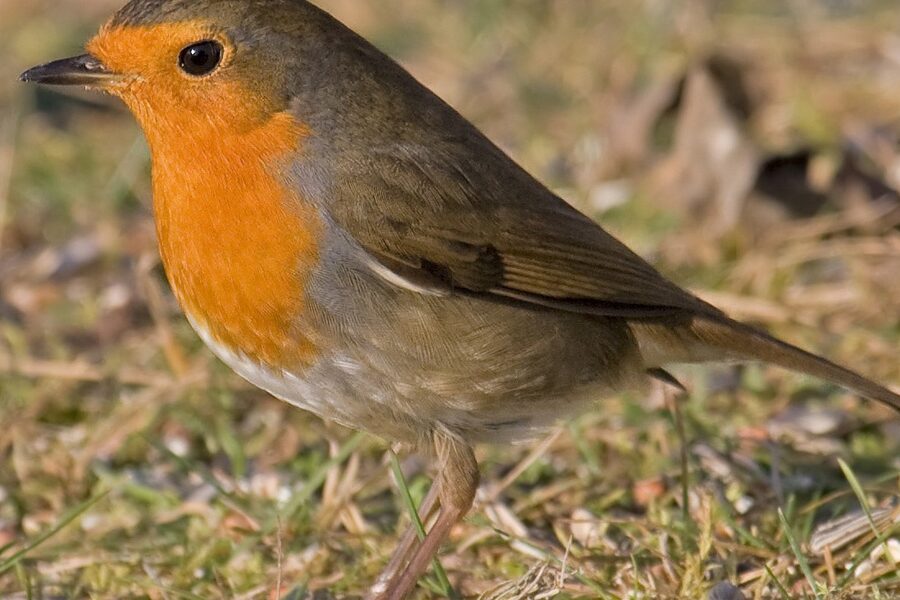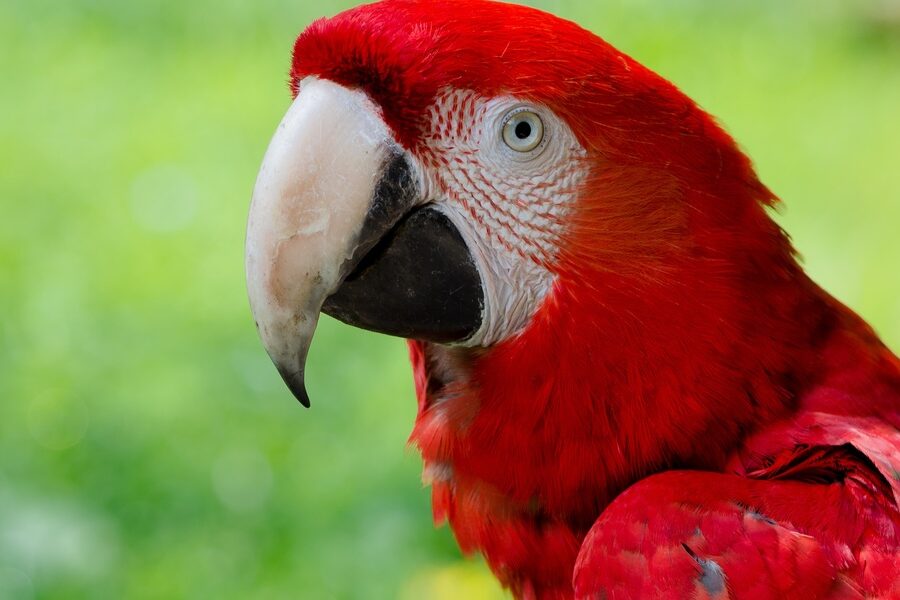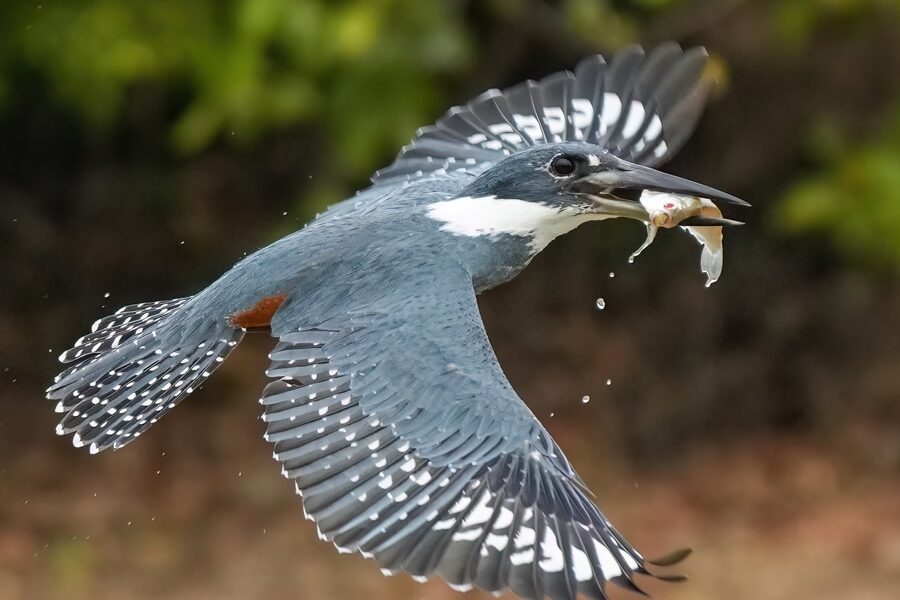Romania’s mix of Danube wetlands, Black Sea coast, and Carpathian highlands makes it one of Europe’s most varied places for birdwatching. Migrants pass through in spring and autumn, while many residents and breeders occupy lakes, reedbeds and mountain forests year-round.
There are 97 Birds of Romania, ranging from Baillon’s Crake to Wilson’s Storm Petrel; for each species the table shows Romanian name,Scientific name,Status/where — you’ll find below.
Where are the best places in Romania to see many species?
The Danube Delta and its lagoons, coastal marshes, and large inland lakes are top for waterbirds and migrants, while the Carpathians host forest and alpine specialists; visit in spring or autumn migration and use local reserves, hides and guided tours for best chances.
How should I interpret the Romanian name,Scientific name,Status/where column?
Treat the Status/where entry as a practical guide to typical presence (breeding, passage, wintering) and common locations rather than real-time sightings; for trip planning check recent local reports or eBird to confirm seasonal occurrences.
Birds of Romania
| Common name | Romanian name | Scientific name | Status/where |
|---|---|---|---|
| Mute Swan | Lebădă de vară | Cygnus olor | Breeding resident; widespread on lakes, rivers, Danube Delta |
| Whooper Swan | Lebădă de iarnă | Cygnus cygnus | Winter visitor; wetlands, Danube Delta, coastal lagoons |
| Tundra Swan | Lebădă mică | Cygnus columbianus | Rare winter visitor; Danube Delta, coastal wetlands |
| Greylag Goose | Gâscă de vară | Anser anser | Breeding resident & winter visitor; wetlands, Danube Delta |
| Greater White-fronted Goose | Gârliță mare | Anser albifrons | Abundant winter visitor; agricultural fields, wetlands |
| Lesser White-fronted Goose | Gârliță mică | Anser erythropus | Rare winter visitor; SE Romania, Danube Delta |
| Taiga Bean Goose | Gâscă de semănătură | Anser fabalis | Winter visitor; agricultural land, wetlands |
| Tundra Bean Goose | Gâscă de tundră | Anser serrirostris | Winter visitor; agricultural land, wetlands |
| Pink-footed Goose | Gâscă cu picioare roz | Anser brachyrhynchus | Vagrant |
| Barnacle Goose | Gâscă călugăr | Branta leucopsis | Rare winter visitor/migrant |
| Red-breasted Goose | Gâscă cu gât roșu | Branta ruficollis | Winter visitor; SE Romania, Black Sea coast |
| Common Shelduck | Călifar alb | Tadorna tadorna | Breeding & winter visitor; coastal lagoons, salt lakes |
| Ruddy Shelduck | Călifar roșu | Tadorna ferruginea | Breeder & migrant; Danube Delta, coastal wetlands |
| Gadwall | Rață sulițar | Mareca strepera | Breeding & winter visitor; widespread on freshwater wetlands |
| Eurasian Wigeon | Rață fluierătoare | Mareca penelope | Winter visitor & migrant; widespread on wetlands |
| Mallard | Rață mare | Anas platyrhynchos | Abundant resident; widespread on all water bodies |
| Northern Shoveler | Rață lingurar | Spatula clypeata | Breeding & winter visitor; wetlands, Danube Delta |
| Northern Pintail | Rață codac | Anas acuta | Winter visitor & migrant; widespread on wetlands |
| Garganey | Rață cârâitoare | Spatula querquedula | Breeding migrant; wetlands, Danube Delta |
| Eurasian Teal | Rață mică | Anas crecca | Winter visitor & migrant, some breeding; widespread wetlands |
| Marbled Duck | Rață marmorată | Marmaronetta angustirostris | Vagrant |
| Red-crested Pochard | Rață cu ciuf | Netta rufina | Breeding & winter visitor; Danube Delta, large lakes |
| Common Pochard | Rață cu cap castaniu | Aythya ferina | Breeding & winter visitor; widespread on deep, open water |
| Ferruginous Duck | Rață roșie | Aythya nyroca | Breeding migrant; wetlands with dense vegetation, Danube Delta |
| Tufted Duck | Rață moțată | Aythya fuligula | Breeding & winter visitor; widespread on lakes, reservoirs |
| Greater Scaup | Rață cap negru | Aythya marila | Winter visitor; Black Sea coast, large inland lakes |
| Velvet Scoter | Rață catifelată | Melanitta fusca | Winter visitor; Black Sea coast |
| Common Scoter | Rață neagră | Melanitta nigra | Winter visitor; Black Sea coast |
| Common Goldeneye | Rață sunătoare | Bucephala clangula | Winter visitor; widespread on rivers, lakes, coast |
| Smew | Ferestraș mic | Mergellus albellus | Winter visitor; wetlands, Danube Delta, coast |
| Common Merganser | Ferestraș mare | Mergus merganser | Winter visitor, rare breeder; mountain rivers, large lakes |
| Red-breasted Merganser | Ferestraș moțat | Mergus serrator | Winter visitor & migrant; coast, large inland waters |
| Hazel Grouse | Ieruncă | Tetrastes bonasia | Resident; Carpathian forests |
| Willow Ptarmigan | Potârniche de tundră | Lagopus lagopus | Vagrant |
| Western Capercaillie | Cocoș de munte | Tetrao urogallus | Resident; mature coniferous forests in the Carpathians |
| Black Grouse | Cocoș de mesteacăn | Lyrurus tetrix | Resident; subalpine habitats in the Carpathians |
| Grey Partridge | Potârniche | Perdix perdix | Resident; agricultural land, grasslands |
| Common Quail | Prepelită | Coturnix coturnix | Breeding migrant; farmland, grasslands |
| Common Pheasant | Fazan | Phasianus colchicus | Resident (introduced); farmland, scrub, woodland edge |
| Red-throated Loon | Cufundar mic | Gavia stellata | Winter visitor; Black Sea coast |
| Black-throated Loon | Cufundar polar | Gavia arctica | Winter visitor & migrant; Black Sea coast, large inland lakes |
| Great Northern Loon | Cufundar mare | Gavia immer | Vagrant |
| Little Grebe | Corcodel mic | Tachybaptus ruficollis | Breeding resident & winter visitor; widespread on vegetated water bodies |
| Great Crested Grebe | Corcodel mare | Podiceps cristatus | Breeding resident & winter visitor; widespread on open water |
| Red-necked Grebe | Corcodel cu gât roșu | Podiceps grisegena | Breeding & winter visitor; Danube Delta, lakes |
| Horned Grebe | Corcodel urecheat | Podiceps auritus | Winter visitor & migrant; coast, large inland lakes |
| Black-necked Grebe | Corcodel cu gât negru | Podiceps nigricollis | Breeding & winter visitor; wetlands, coastal lagoons |
| Wilson’s Storm Petrel | Pasărea Furtunii a lui Wilson | Oceanites oceanicus | Vagrant |
| European Storm Petrel | Pasărea furtunii | Hydrobates pelagicus | Vagrant |
| Northern Gannet | Sula | Morus bassanus | Vagrant |
| Pygmy Cormorant | Cormoran mic | Microcarbo pygmeus | Breeding resident; Danube Delta, wetlands |
| Great Cormorant | Cormoran mare | Phalacrocorax carbo | Breeding resident & winter visitor; widespread on coasts & inland waters |
| European Shag | Cormoran moțat | Gulosus aristotelis | Winter visitor; Black Sea coast |
| Dalmatian Pelican | Pelican creț | Pelecanus crispus | Breeding migrant; Danube Delta, coastal lagoons |
| Great White Pelican | Pelican comun | Pelecanus onocrotalus | Breeding migrant; Danube Delta, coastal lagoons |
| Eurasian Bittern | Buhai de baltă | Botaurus stellaris | Breeding resident; extensive reedbeds, Danube Delta |
| Little Bittern | Stârc pitic | Ixobrychus minutus | Breeding migrant; wetlands with dense vegetation |
| Black-crowned Night Heron | Stârc de noapte | Nycticorax nycticorax | Breeding migrant; wetlands, Danube Delta |
| Squacco Heron | Stârc galben | Ardeola ralloides | Breeding migrant; Danube Delta, wetlands |
| Cattle Egret | Stârc de cireadă | Bubulcus ibis | Breeding migrant, increasing; wetlands, pastures |
| Grey Heron | Stârc cenușiu | Ardea cinerea | Breeding resident & winter visitor; widespread near water |
| Purple Heron | Stârc roșu | Ardea purpurea | Breeding migrant; extensive reedbeds, Danube Delta |
| Great Egret | Egretă mare | Ardea alba | Breeding resident & winter visitor; widespread in wetlands |
| Little Egret | Egretă mică | Egretta garzetta | Breeding migrant; widespread in wetlands |
| Glossy Ibis | Țigănuș | Plegadis falcinellus | Breeding migrant; Danube Delta, wetlands |
| Eurasian Spoonbill | Lopătar | Platalea leucorodia | Breeding migrant; Danube Delta, wetlands |
| Greater Flamingo | Flamingo | Phoenicopterus roseus | Irregular visitor/vagrant; coastal lagoons, salt lakes |
| Osprey | Uliu pescar | Pandion haliaetus | Passage migrant; widespread near water |
| European Honey Buzzard | Viespar | Pernis apivorus | Breeding migrant; woodlands, forests |
| Short-toed Snake Eagle | Șerpar | Circaetus gallicus | Breeding migrant; open country with scattered trees, hills |
| Lesser Spotted Eagle | Acvilă țipătoare mică | Clanga pomarina | Breeding migrant; wet forests, riverine plains |
| Greater Spotted Eagle | Acvilă țipătoare mare | Clanga clanga | Rare migrant & winter visitor; wetlands, floodplains |
| Booted Eagle | Acvilă mică | Hieraaetus pennatus | Breeding migrant; forested hills and mountains |
| Steppe Eagle | Acvilă de stepă | Aquila nipalensis | Vagrant/rare migrant; open plains |
| Imperial Eagle | Acvilă de câmp | Aquila heliaca | Rare breeder & migrant; lowland plains, foothills |
| Golden Eagle | Acvilă de munte | Aquila chrysaetos | Resident; remote Carpathian Mountains |
| Eurasian Griffon Vulture | Vultur sur | Gyps fulvus | Vagrant/former breeder; rocky gorges, mountains |
| Cinereous Vulture | Vultur negru | Aegypius monachus | Vagrant/former breeder; mountains, open plains |
| Egyptian Vulture | Hoitar | Neophron percnopterus | Vagrant/former breeder; rocky, open country |
| Hen Harrier | Erete vânăt | Circus cyaneus | Winter visitor & migrant; open farmland, grasslands |
| Pallid Harrier | Erete alb | Circus macrourus | Rare breeder & migrant; steppe habitats |
| Montagu’s Harrier | Erete de stuf | Circus pygargus | Breeding migrant; open farmland, grasslands, wetlands |
| Marsh Harrier | Erete de stuf | Circus aeruginosus | Breeding migrant; extensive reedbeds |
| Levant Sparrowhawk | Uliu cu picioare scurte | Accipiter brevipes | Breeding migrant; riverine forests, wooded plains |
| Eurasian Sparrowhawk | Uliu păsărar | Accipiter nisus | Resident & winter visitor; widespread in woodlands, gardens |
| Northern Goshawk | Uliu porumbar | Accipiter gentilis | Resident; mature forests |
| Common Buzzard | Șorecar comun | Buteo buteo | Resident; widespread in varied habitats |
| Long-legged Buzzard | Șorecar mare | Buteo rufinus | Breeding migrant; steppe and rocky areas in Dobrogea |
| Rough-legged Buzzard | Șorecar încălțat | Buteo lagopus | Winter visitor; open country, farmland |
| Water Rail | Cârsteț de baltă | Rallus aquaticus | Breeding resident & winter visitor; dense reedbeds |
| Spotted Crake | Cârstel de baltă | Porzana porzana | Breeding migrant; marshes, wet meadows |
| Little Crake | Cârstel pitic | Zapornia parva | Breeding migrant; wetlands with dense vegetation |
| Baillon’s Crake | Cârstel cenușiu | Zapornia pusilla | Rare breeding migrant; wetlands |
| Corn Crake | Cristel de câmp | Crex crex | Breeding migrant; damp meadows, hayfields |
| Common Moorhen | Găinușă de baltă | Gallinula chloropus | Breeding resident; widespread on vegetated ponds and canals |
| Eurasian Coot | Lișiță | Fulica atra | Breeding resident & winter visitor; widespread on open water |
| Common Crane | Cocor | Grus grus | Passage migrant, rare breeder; wetlands, farmland |
Images and Descriptions
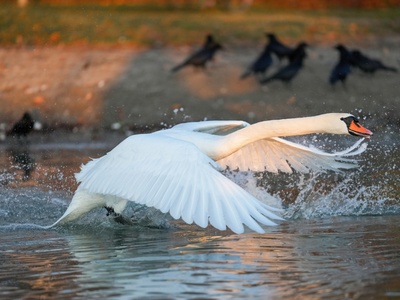
Mute Swan
The familiar large white swan with a bright orange bill and a prominent black knob. Graceful and often seen in pairs, it holds its neck in an elegant ‘S’ curve. Though silent from a distance, it can hiss aggressively when approached.
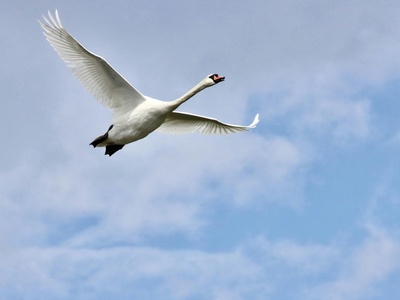
Whooper Swan
A large, elegant white swan with a distinctive yellow and black bill, where the yellow forms a sharp wedge shape. Its loud, bugling “whoop-whoop” call is a classic sound of Romanian winters, especially in the Danube Delta and coastal areas.
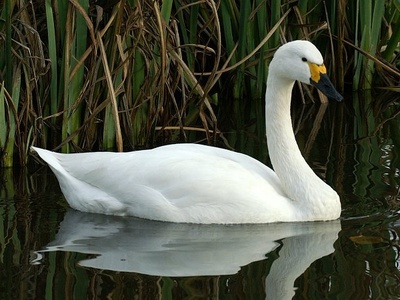
Tundra Swan
Smaller than the Whooper Swan, with a bill that is mostly black with a smaller, rounded patch of yellow at the base. It is a rare but regular visitor to large wetland areas, often mingling with flocks of other swans and geese.
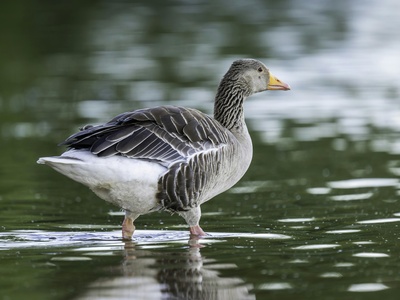
Greylag Goose
The ancestor of most domestic geese, this large, bulky goose has a grey-brown body, a pinkish-orange bill, and pink legs. It’s a common sight in the Danube Delta, where its honking calls echo across the reedbeds, especially during breeding season.
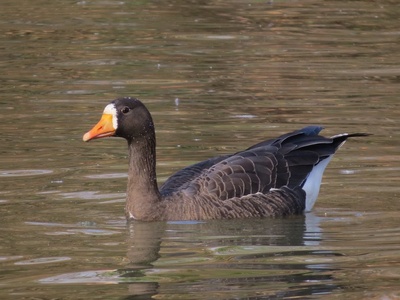
Greater White-fronted Goose
A medium-sized grey goose recognized by the prominent white patch at the base of its pinkish bill and black bars on its belly. It forms enormous flocks in winter, often feeding in fields in southeastern Romania, creating a spectacular wildlife sight.
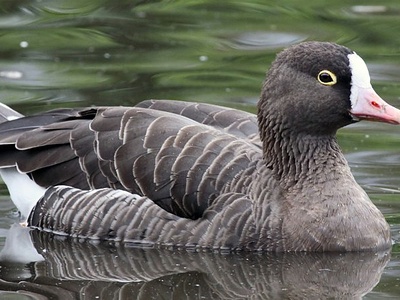
Lesser White-fronted Goose
A globally vulnerable species, this small goose resembles its larger cousin but is daintier, with a smaller pink bill and a distinct yellow eye-ring. Seeing one is a highlight for any birdwatcher, usually found within huge flocks of Greater White-fronted Geese.
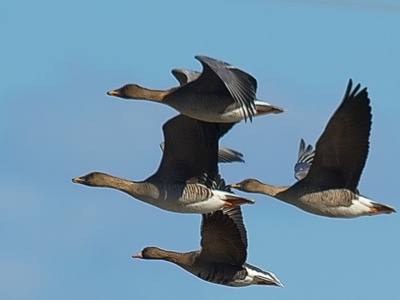
Taiga Bean Goose
A large, dark goose with a long bill that is black with an orange band. It feeds on agricultural fields in winter. Distinguishing it from the Tundra Bean Goose is a challenge for experts, focusing on bill shape and overall structure.
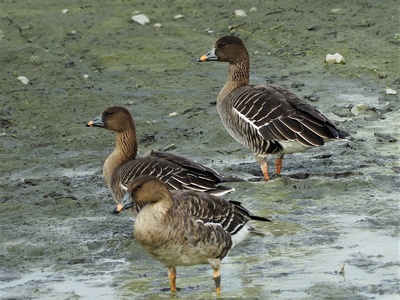
Tundra Bean Goose
Slightly smaller and more compact than its Taiga cousin, with a shorter, stubbier bill that has an orange band. Like the Taiga Bean Goose, it is a winter visitor found feeding in open fields, often in mixed flocks of geese.
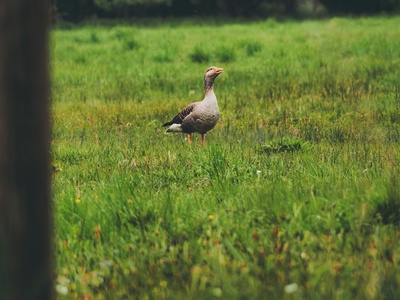
Pink-footed Goose
A rare visitor to Romania. This goose has a darker head and neck, a grey-toned body, a short, black-and-pink-banded bill, and its namesake pink feet. Any sighting is notable and typically occurs within flocks of other wintering geese.
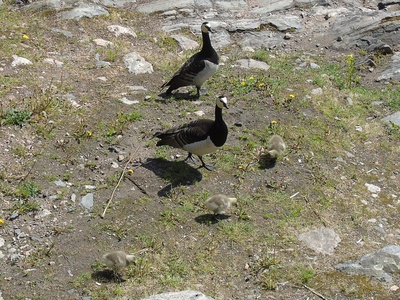
Barnacle Goose
An unmistakable goose with a creamy-white face, black neck and breast, and a neatly barred grey back. Though common in Western Europe, it’s a scarce but beautiful winter visitor to Romania, often found with other geese species in wetlands.
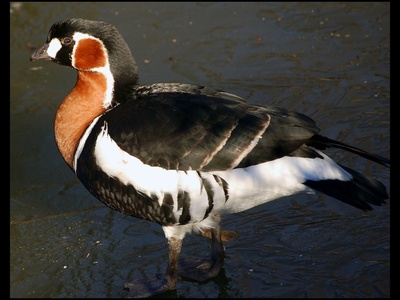
Red-breasted Goose
A stunningly patterned small goose with a deep chestnut-red breast and cheeks, bordered by white lines. A globally vulnerable species, Romania hosts a significant portion of its world wintering population, making coastal Dobrogea a crucial conservation area.
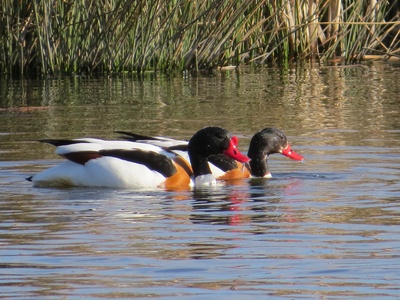
Common Shelduck
A large, goose-like duck with striking white, black, and chestnut plumage and a bright red bill. It’s a characteristic bird of coastal wetlands and saline lakes, often seen nesting in old rabbit burrows or other ground cavities.
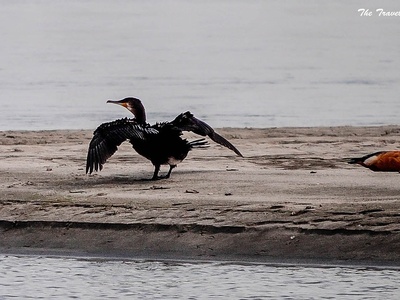
Ruddy Shelduck
A beautiful, bright orange-brown duck with a paler, creamy head. The male has a thin black neck-ring during the breeding season. It’s a distinctive sight in the wetlands of Dobrogea, known for its loud, nasal calls.
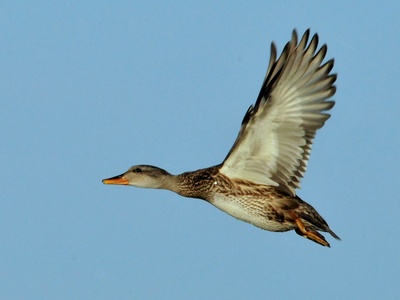
Gadwall
A subtly handsome duck. The male is finely patterned in grey with a distinctive black rear end and a white patch (speculum) on its wing, visible in flight. It’s a common but often overlooked inhabitant of vegetated lakes and marshes.
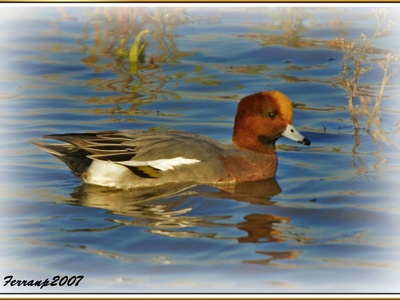
Eurasian Wigeon
The male is striking with a chestnut head, a creamy-yellow forehead, a pinkish breast, and a grey body. It’s best known for its clear, whistling call, “whee-ooo,” which gives it its name. Large flocks gather on open water in winter.
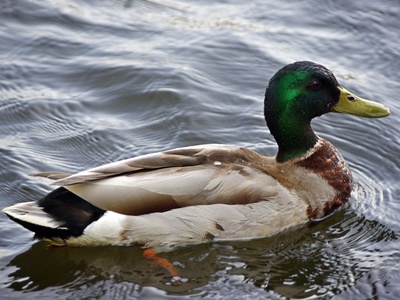
Mallard
The most familiar duck. The male has a glossy green head, a white neck-ring, and a purple-brown breast, while the female is a mottled brown for camouflage. Adaptable and ubiquitous, it’s found on everything from city ponds to wild rivers.
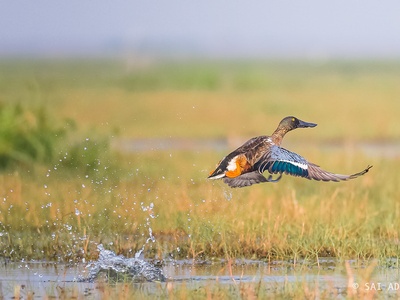
Northern Shoveler
Instantly recognizable by its huge, spatula-shaped bill, used for sifting food from the water. The breeding male is spectacular, with a green head, white breast, and rich chestnut flanks. It’s a common sight in shallow, nutrient-rich wetlands.
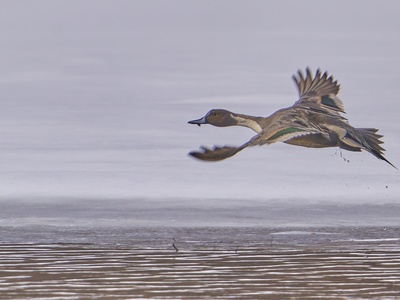
Northern Pintail
An elegant, slender duck. The male is unmistakable with its long, pointed tail feathers, chocolate-brown head, and a distinctive white stripe running up its neck. It’s a graceful presence on open water during migration and winter.
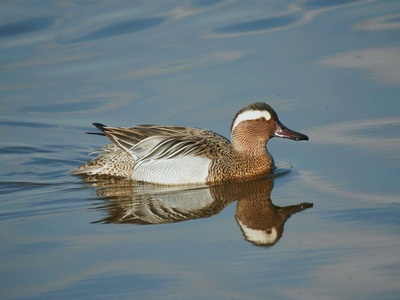
Garganey
A small, attractive duck. The breeding male has a broad, curving white stripe over its eye on a brown-purple head. It’s one of the first ducks to migrate south in late summer. Its rattling, wooden call is a key feature of spring marshes.
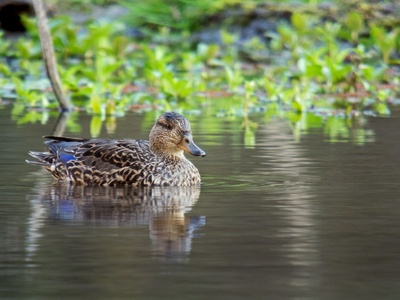
Eurasian Teal
The smallest European duck. The male is a compact, grey bird with a beautiful chestnut head and a sweeping green eye-patch. Fast and agile in flight, they often form large, swirling flocks over wetlands in winter.
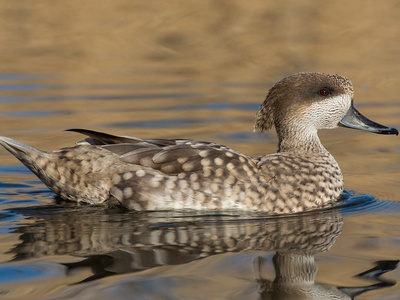
Marbled Duck
A very rare vagrant. This is a small, pale, sandy-brown duck covered in whitish spots, giving it a marbled look. It has a dark eye-patch and a shaggy-looking head. Any record in Romania is a major ornithological event.
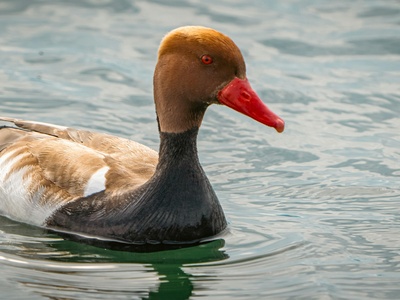
Red-crested Pochard
A spectacular diving duck. The male has a large, puffy, rusty-orange head, a bright red bill, and black and white flanks. It’s a jewel of the Danube Delta’s lakes, where it dives for aquatic plants.
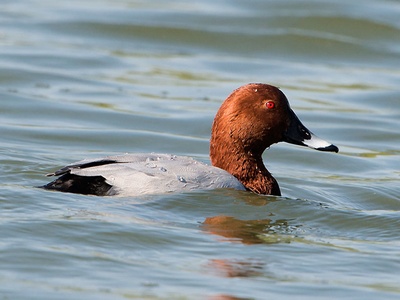
Common Pochard
A classic diving duck. The male has a rusty-red head, a black breast, and a pale grey body. It often gathers in large rafts on deeper lakes and reservoirs during winter, diving to feed on submerged vegetation.
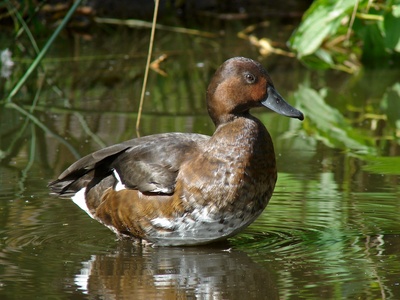
Ferruginous Duck
A rich, dark chestnut-brown diving duck with a contrasting white undertail and, in males, a striking white eye. It prefers reed-fringed pools and is a key species of the Danube Delta, though its populations have declined across Europe.
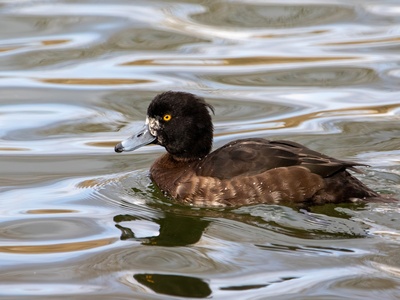
Tufted Duck
A compact diving duck easily identified by the male’s black-and-white plumage and a long, drooping crest on his head. The female is dark brown with a shorter crest. Often found in large flocks on open water during the winter months.
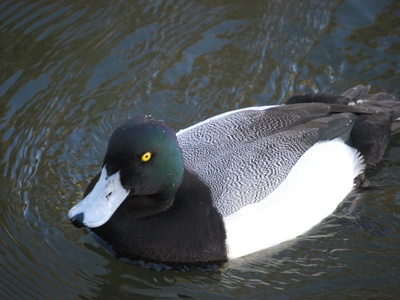
Greater Scaup
Similar to the Tufted Duck, but the male has a grey, vermiculated back instead of black and lacks the long crest, showing a rounded head with a green gloss. It is primarily a winter visitor, especially common on the Black Sea coast.
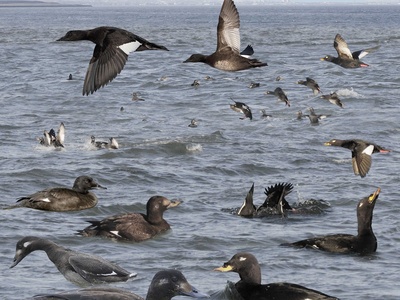
Velvet Scoter
A large, bulky sea duck. The male is all black with a small white patch under the eye and a large white speculum on the wing, very obvious in flight. It spends the winter on the Black Sea, often seen in flocks offshore.
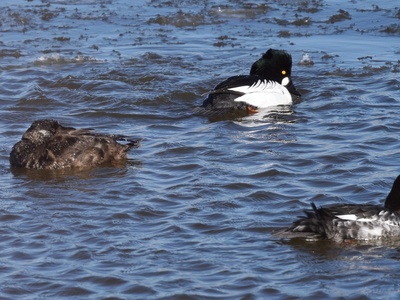
Common Scoter
A medium-sized sea duck. The male is completely black except for a yellow-orange patch on its bill knob. Females are dark brown with pale cheeks. It winters in marine waters, often seen as distant rafts of black birds on the sea.
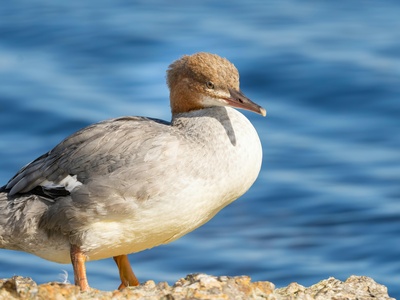
Common Goldeneye
A striking diving duck. The male is black and white with a glossy green-black, triangular head and a round white spot between the eye and bill. Its wings make a distinctive whistling sound in flight, giving it its Romanian name.
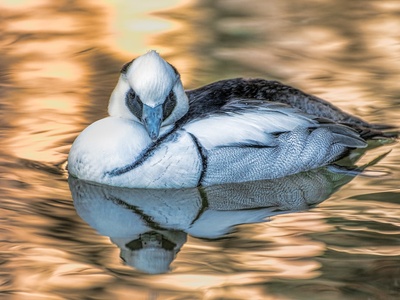
Smew
A small, stunning sawbill duck. The male is mostly white with fine black lines, earning it the nickname “white nun.” The female is grey with a chestnut cap. They are sought-after winter visitors on lakes and coastal lagoons.
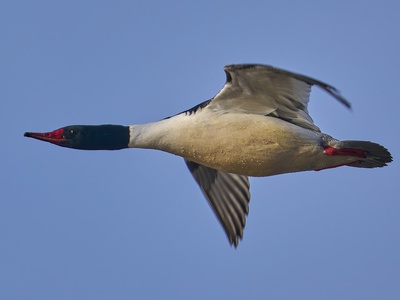
Common Merganser
A large, long-bodied sawbill duck. The male has a glossy dark-green head, a white body with a salmon-pink tinge, and a thin, hooked red bill. It’s at home on fast-flowing rivers as well as large lakes in winter.
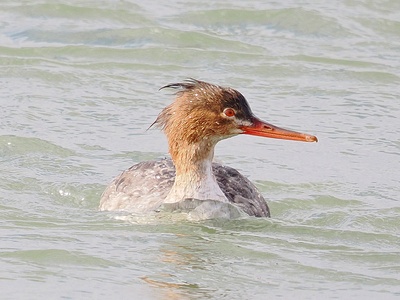
Red-breasted Merganser
Sleeker than the Common Merganser, the male has a shaggy, double crest on its glossy green-black head, a reddish-brown breast band, and streaked flanks. It is more common in coastal, saltwater habitats during the winter.
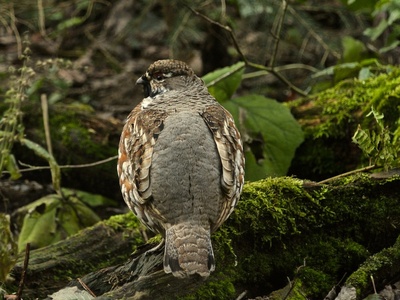
Hazel Grouse
A small, secretive grouse of dense mountain forests. Its intricately patterned grey, brown, and white plumage provides perfect camouflage. Its presence is often revealed by its high-pitched, whistling song, a characteristic sound of the Carpathians.
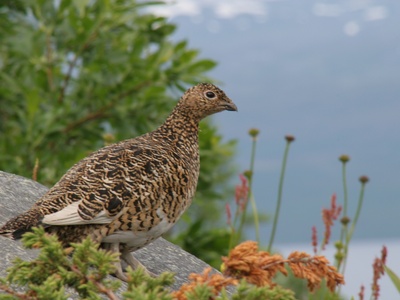
Willow Ptarmigan
An extremely rare vagrant from northern tundra habitats. This bird is famous for its seasonal camouflage, being mottled brown in summer and pure white in winter. Any sighting in Romania would be exceptional, likely a result of extreme weather.
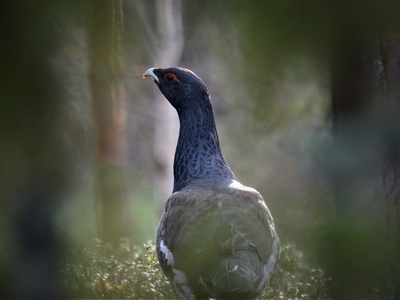
Western Capercaillie
The world’s largest grouse, a spectacular bird of old-growth mountain forests. The male is huge and dark, with a metallic green breast and a fan-tailed lekking display. It’s a flagship species for the conservation of Romania’s pristine Carpathian forests.
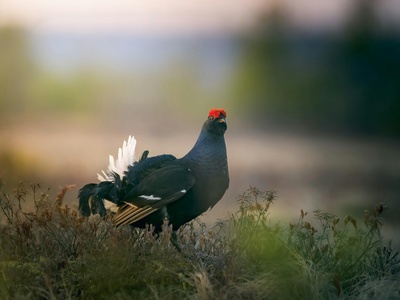
Black Grouse
Famous for its communal spring displays (leks), where males with lyre-shaped tails and red “eyebrows” compete for females. It inhabits the transition zone between mountain forests and alpine meadows, a truly special bird of the high Carpathians.
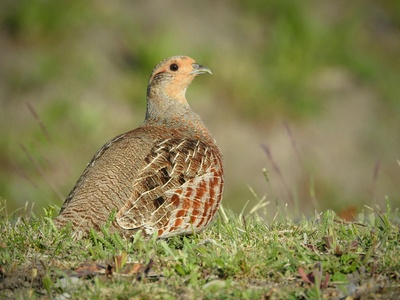
Grey Partridge
A round, ground-dwelling bird with a rusty-orange face and a dark horseshoe-shaped patch on the belly of the male. Once very common, its populations have declined due to agricultural intensification. Its harsh, grating call is distinctive.
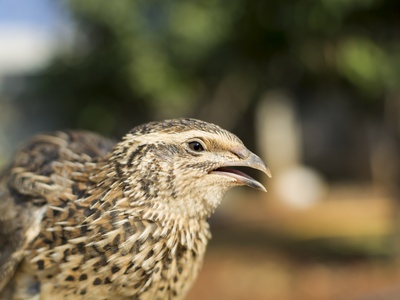
Common Quail
A small, plump, and secretive gamebird. It is more often heard than seen, with the male’s distinctive “whit-whit’wit” song carrying across open fields on summer evenings. It’s a long-distance migrant, wintering in Africa.
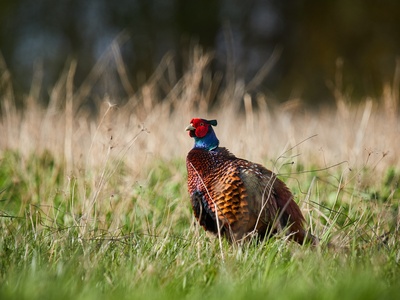
Common Pheasant
Originally from Asia but now a familiar resident. The male is ornate, with iridescent copper-and-gold plumage, a green head, and red facial wattles. The female is a well-camouflaged sandy brown. Its harsh, crowing call is a common sound of the countryside.
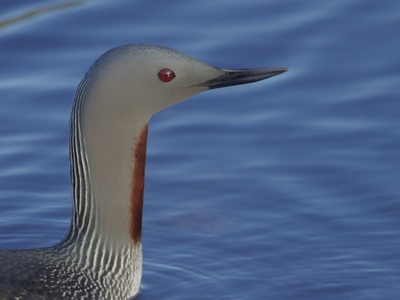
Red-throated Loon
The smallest of the loons (divers). In winter, it has a grey back and white underparts, with a finely speckled back and a slightly upturned, slender bill. It is seen primarily on the Black Sea during the winter months.
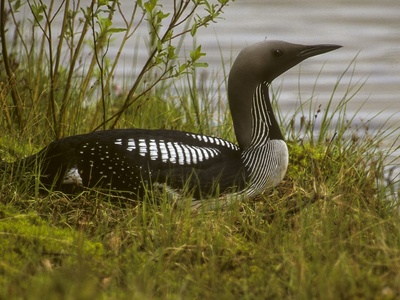
Black-throated Loon
Larger than the Red-throated, this loon has a smoother, paler grey head and neck in winter, with a sharp contrast to its white throat. In flight, it appears long-bodied and powerful. A regular winter visitor to the coast and large reservoirs.
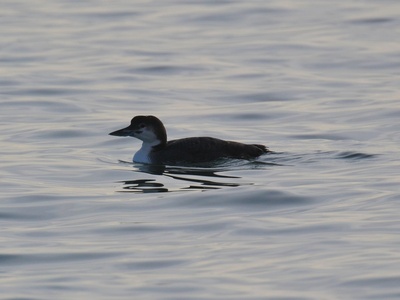
Great Northern Loon
A very rare vagrant to Romania. It’s a large, powerfully built loon with a thick, dagger-like bill. In winter plumage, it has a dark “half-collar” on its neck. A sighting of this North American and Icelandic breeder is a significant event.
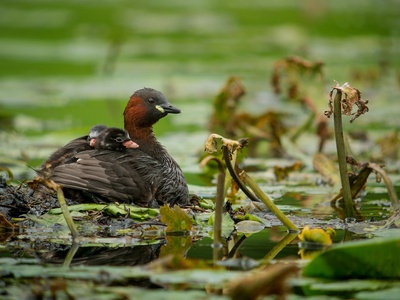
Little Grebe
A small, dumpy waterbird that often dives abruptly with a ‘plop’. In summer it has a dark body and a chestnut throat; in winter it’s much paler. Its loud, whinnying trill is a common sound around ponds and slow-moving rivers.
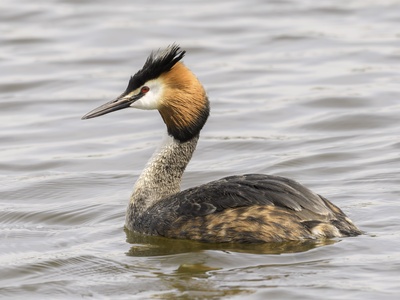
Great Crested Grebe
An elegant waterbird famous for its elaborate courtship “weed dance.” In summer, it sports ornate head plumes. In winter, it is a more subdued black and white. It is common on lakes and reservoirs, often seen carrying its striped chicks on its back.
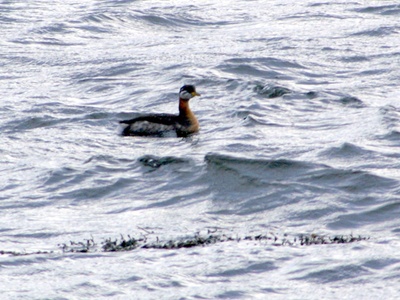
Red-necked Grebe
Stockier than the Great Crested Grebe, with a thick neck and a heavier, yellowish bill. In breeding plumage, it has a rich red neck and white cheeks. It’s a characteristic bird of the reedbeds and lakes of the Danube Delta.
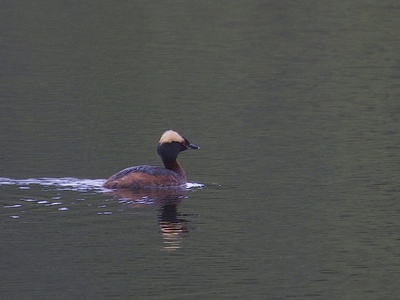
Horned Grebe
A small, neat grebe. In its striking breeding plumage, it has golden “horns” on a black head. In winter, it’s a clean black-and-white bird with a sharp demarcation line through the eye and a distinct white tip to its bill.
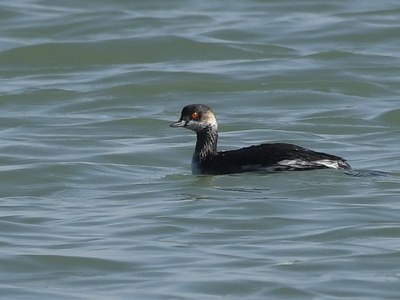
Black-necked Grebe
A small grebe with a distinctly peaked crown and an upturned bill. The breeding adult is black and chestnut with a beautiful golden spray of feathers behind the eye. It often breeds in colonies and gathers in large flocks during winter.
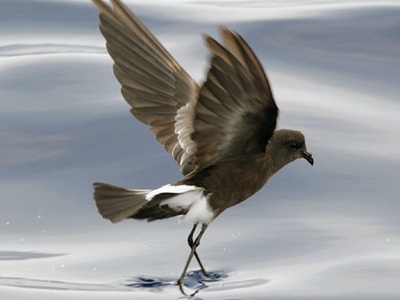
Wilson’s Storm Petrel
An exceptionally rare vagrant from the Southern Hemisphere. A tiny, dark seabird with a prominent white rump that flutters and patters its feet on the water’s surface while feeding. Any sighting in the Black Sea is extraordinary.
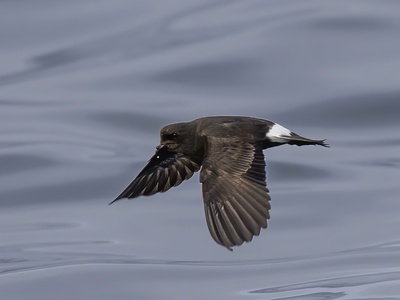
European Storm Petrel
A very rare visitor to the Black Sea. This tiny seabird is sooty-black with a white rump and a white bar on its underwing. It flies low over the waves with a fluttering, bat-like action. Records in Romania are few and far between.
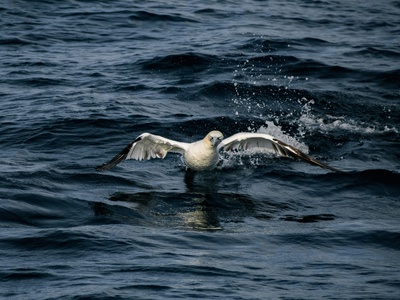
Northern Gannet
A rare vagrant to the Black Sea. A huge, spectacular seabird with brilliant white plumage, black wingtips, and a yellowish head. It is famous for its dramatic plunge-dives from great heights to catch fish. A true ocean wanderer.
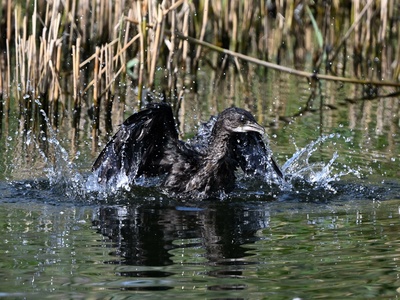
Pygmy Cormorant
A small, dark cormorant, about the size of a duck. In breeding plumage, it is glossy black with fine white flecks on its head and neck. A key species of the Danube Delta, where it breeds in large colonies in willow or reedbeds.
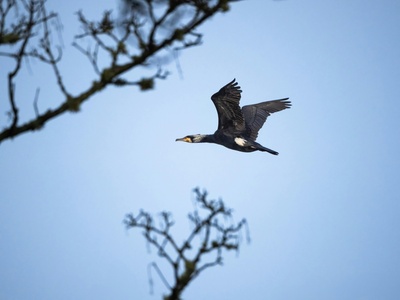
Great Cormorant
A large, powerful, dark waterbird often seen perched with its wings spread out to dry. In breeding season, adults have white patches on their head and thigh. It is an expert fisher, found on almost any significant body of water.
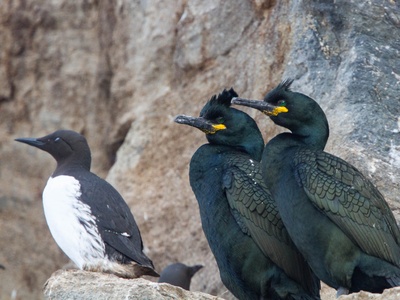
European Shag
A coastal cormorant, sleeker and more slender than the Great Cormorant, with a thinner bill. In breeding plumage, it has a glossy green-black sheen and a distinctive forward-curving crest. It is found exclusively on the Black Sea coast in Romania.
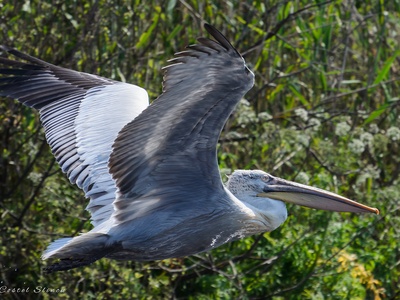
Dalmatian Pelican
A massive, silvery-white pelican, the largest freshwater bird in the world. It has shaggy, curly feathers on its nape and a bright orange-red lower mandible pouch in the breeding season. The Danube Delta holds its largest remaining European breeding colony.
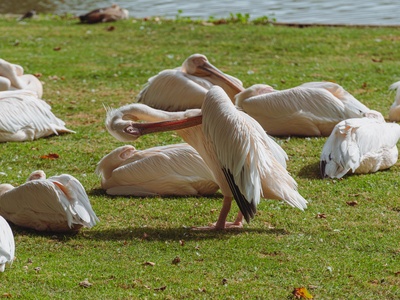
Great White Pelican
A huge, sociable white bird famous for its enormous yellow throat pouch. It breeds in vast, noisy colonies in the Danube Delta, and flocks can be seen fishing cooperatively, herding fish into the shallows. A true icon of the Delta.
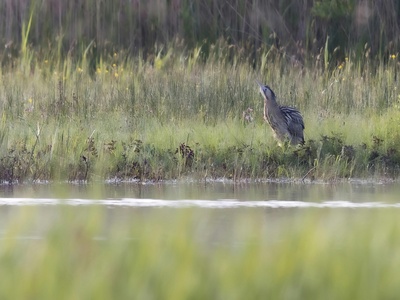
Eurasian Bittern
A secretive, stocky heron perfectly camouflaged in streaky brown plumage to blend with reeds. It is rarely seen, but its strange, far-carrying booming call in spring is one of the most evocative sounds of the marshlands.
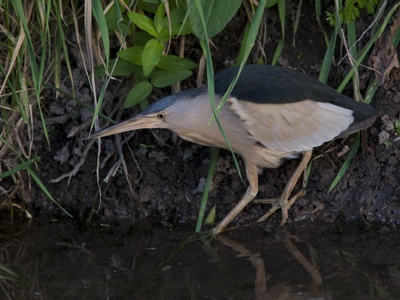
Little Bittern
A tiny, shy heron. The male is strikingly patterned with a black cap and back, and buff-white wing patches. The female is browner and streakier. It skulks in dense reeds, often climbing like a rail, and is very difficult to spot.
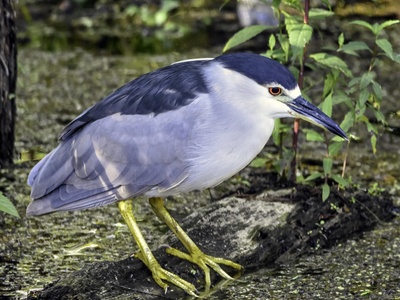
Black-crowned Night Heron
A stocky, medium-sized heron with a black back and cap, grey wings, and white underparts. As its name suggests, it is most active at dawn and dusk. It breeds colonially in trees near water, and its guttural “kwok” call is a common evening sound.
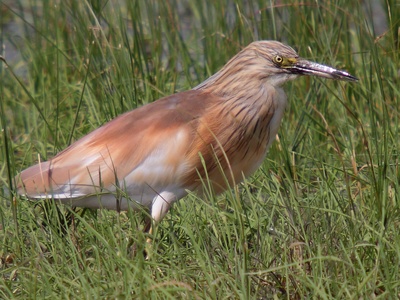
Squacco Heron
A small, compact heron that appears a uniform sandy-buff colour when at rest. In flight, it transforms, revealing stunningly white wings, back, and tail. A characteristic and beautiful bird of the heavily vegetated wetlands in the Danube Delta.
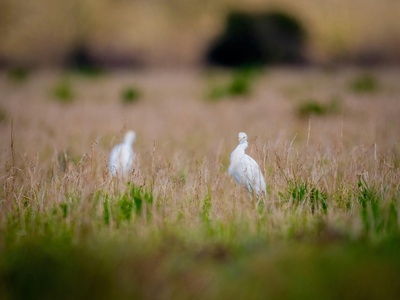
Cattle Egret
A small, stocky white egret that is rapidly expanding its range. In breeding plumage, it has buff-orange patches on its crown, breast, and back. It is often seen foraging near livestock, feeding on insects disturbed by their movement.
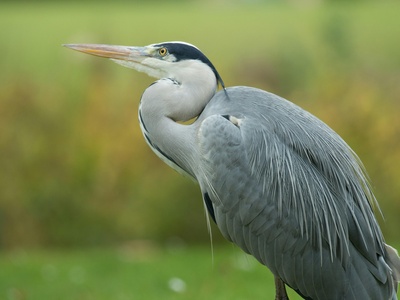
Grey Heron
A large, majestic heron with long legs, a snake-like neck, and dagger-like bill. Its plumage is pale grey above and whitish below, with a black crest. It is a common and patient hunter, seen standing motionless in the shallows of any water body.
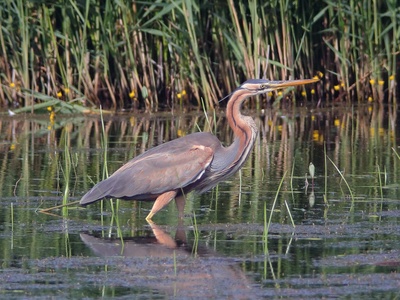
Purple Heron
A slender, dark heron with a beautiful mix of grey, rufous, and purple tones. It is more secretive than the Grey Heron, perfectly adapted to a life within dense reedbeds. The Danube Delta is one of its most important European breeding grounds.
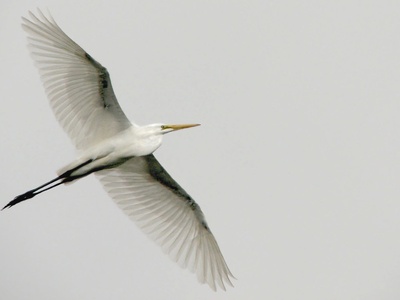
Great Egret
A large, elegant, all-white heron with a yellow bill (which turns black in breeding season) and blackish legs. Once rare, it has made a remarkable comeback and is now a common and graceful sight in wetlands across the country.
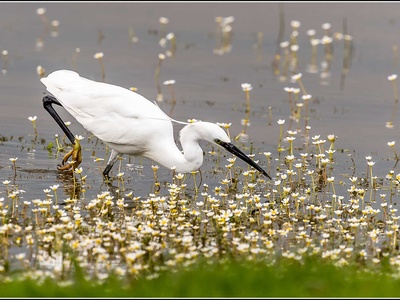
Little Egret
A delicate, small white heron with a slender black bill, black legs, and distinctive bright yellow feet. In the breeding season, it sports two long, elegant plumes on its nape. It actively chases its prey in shallow water.
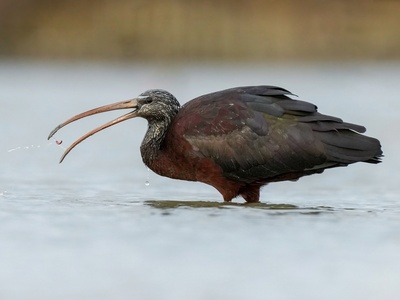
Glossy Ibis
A medium-sized, dark waterbird that appears black from a distance. In good light, its plumage shows beautiful bronze, green, and purple iridescent sheens. It breeds in large colonies in the Danube Delta, probing for food with its long, curved bill.
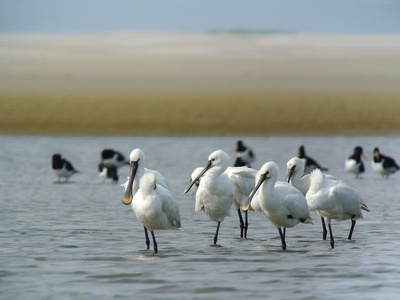
Eurasian Spoonbill
An unmistakable large white waterbird with a long, black, uniquely spoon-shaped bill. It feeds by sweeping its bill from side to side in shallow water. It nests colonially, and the Danube Delta hosts a very significant breeding population.
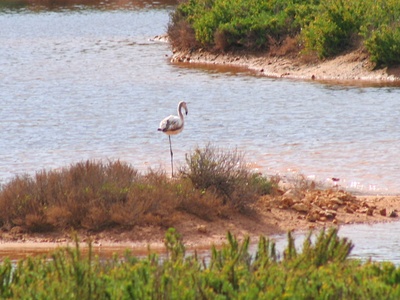
Greater Flamingo
An unmistakable tall, pinkish-white bird with a thick, bent bill. Though not a regular breeder, flocks increasingly appear and spend time at saline coastal lagoons like Techirghiol or Sinoe, always creating a stir among birdwatchers.
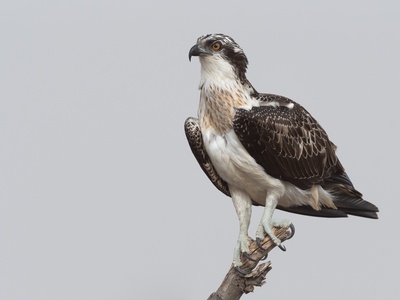
Osprey
A large, eagle-like raptor specialized in catching fish. It is mostly brown above and white below, with a white head and a dark mask through the eye. Seen during migration over lakes and rivers, often hovering before a dramatic plunge-dive.
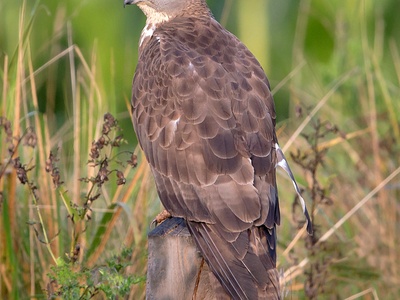
European Honey Buzzard
A medium-sized raptor that resembles a Common Buzzard but has a smaller, more pigeon-like head. Its diet is specialized on the larvae of wasps and bees. It is most often seen during migration when large numbers pass through Romania.
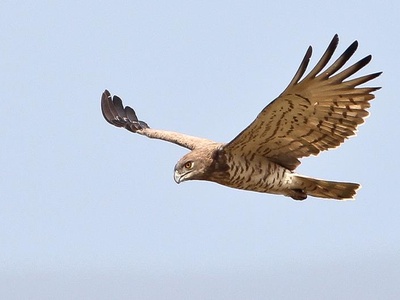
Short-toed Snake Eagle
A large, pale eagle with a big, owl-like head and bright yellow eyes. It specializes in hunting reptiles, especially snakes. It can be seen soaring over dry, sunny slopes or hovering, scanning the ground for prey.
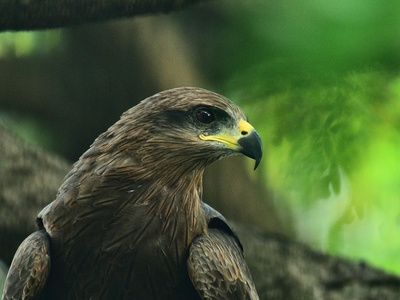
Lesser Spotted Eagle
A medium-sized, dark brown eagle. It is Romania’s most common eagle, breeding in lowland and foothill forests next to wet meadows where it hunts for small mammals and amphibians. It’s a key species for Romanian forest conservation.
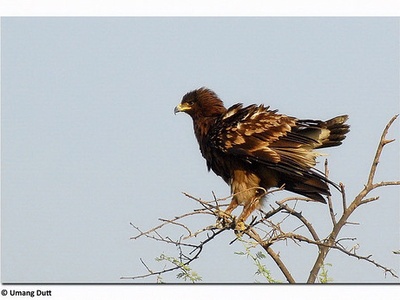
Greater Spotted Eagle
Slightly larger and darker than the Lesser Spotted Eagle, with a broader “hand” in flight. It is a rare bird in Romania, seen mainly during migration or winter in large wetland areas, where it sometimes hybridizes with its smaller cousin.
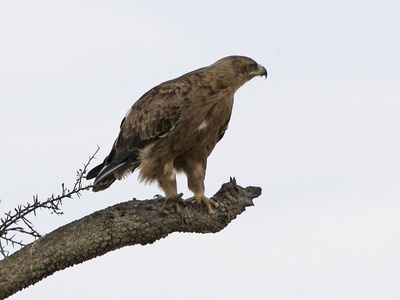
Booted Eagle
A small, agile eagle that comes in two colour morphs: pale (white underparts) and dark (brown underparts). It is a fast and dynamic hunter, preying on birds and small mammals in wooded, hilly landscapes.
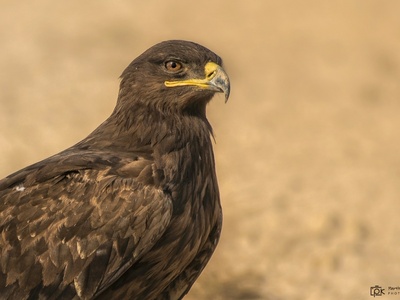
Steppe Eagle
A large, bulky, dark brown eagle of open steppes. It has a powerful build and a noticeable gape that extends to behind the eye. Formerly a breeder, it is now only a very rare migrant or vagrant in eastern Romania.
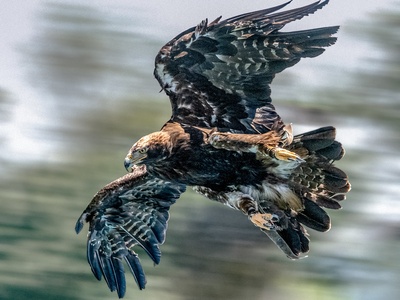
Imperial Eagle
A magnificent, large dark eagle with a golden-cream nape and, in adults, distinct white “braces” on the shoulders. It is a rare and protected species, with a small but recovering breeding population in western and southeastern Romania.
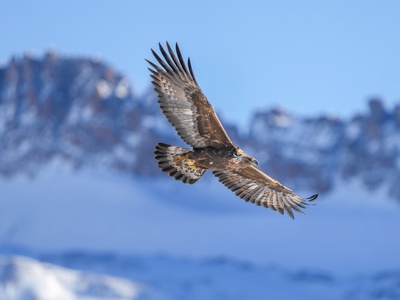
Golden Eagle
The iconic eagle of the mountains. A huge, powerful raptor, dark brown overall with a golden-tawny head and neck. It soars majestically over high peaks and remote valleys of the Carpathians, a true symbol of wilderness.
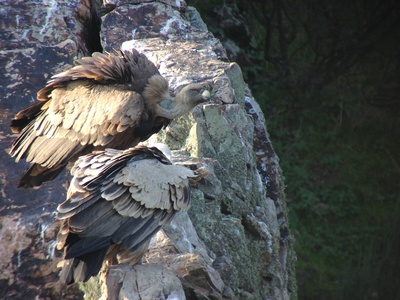
Eurasian Griffon Vulture
A huge vulture with broad wings, a pale sandy-brown body, and a distinctive ruff of white downy feathers around the base of its neck. Once a breeder, it is now a rare visitor, usually from populations in the Balkans.
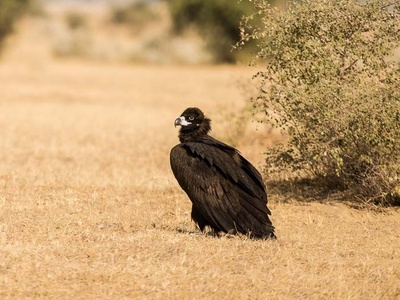
Cinereous Vulture
The largest bird of prey in Europe, a massive, dark vulture with a powerful bill and a pale, bare-skinned head. Formerly a breeding species, it is now an extremely rare vagrant, with reintroduction projects aiming to bring it back.
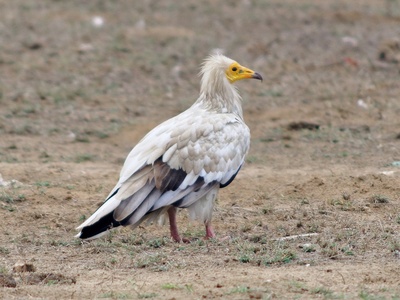
Egyptian Vulture
A small, distinctive vulture, mostly white with black flight feathers and a bare yellow face. It was once a breeding bird in Dobrogea’s gorges but is now only an exceptional vagrant, highlighting a dramatic decline across the Balkans.
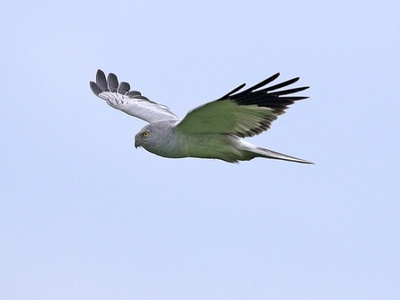
Hen Harrier
A slender, long-winged harrier. The male is a ghostly pale grey with black wingtips, while the female (“ringtail”) is brown and streaked with a white rump patch. It glides low over open fields in winter, hunting for small rodents.
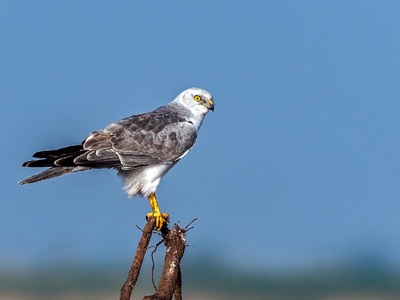
Pallid Harrier
A very rare breeding bird of the eastern steppes. The male is even paler than the Hen Harrier, with a smaller black wedge on its wingtips. Its buoyant, graceful flight is a beautiful sight over the grasslands of Dobrogea.
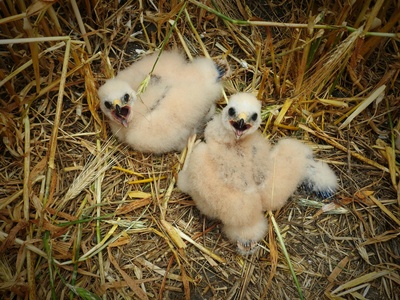
Montagu’s Harrier
The most slender and graceful harrier. The male is grey with a black wingbar in addition to black wingtips. It nests on the ground in grasslands and cereal fields. Its elegant, dihedral flight is a classic sight of the Romanian plains in summer.
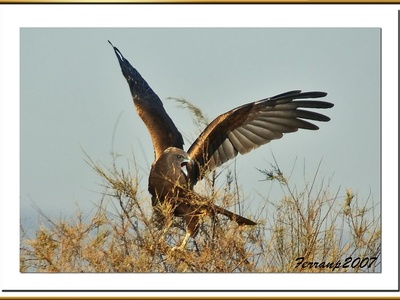
Marsh Harrier
The largest and broadest-winged harrier, strongly associated with wetlands. The male has a complex pattern of brown, grey, and black, while the female is chocolate brown with a creamy head. It quarters low over reedbeds, hunting for birds and frogs.
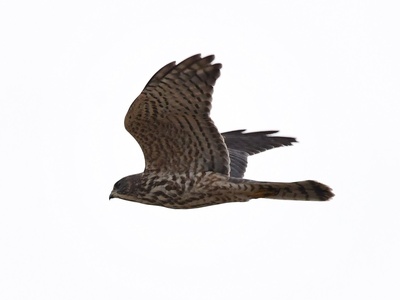
Levant Sparrowhawk
A small, slender hawk of southeastern Europe. The male is blue-grey above and finely barred reddish below, with dark wingtips. It is a social migrant, and large flocks can sometimes be seen passing through Dobrogea in autumn.
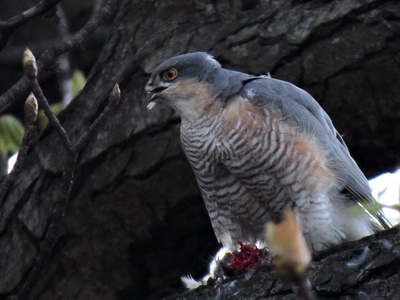
Eurasian Sparrowhawk
A small, agile hawk specializing in hunting small birds. The male is blue-grey above with reddish barring below, while the female is larger and browner. Its surprise attacks in gardens and woodlands are a dramatic part of avian life.
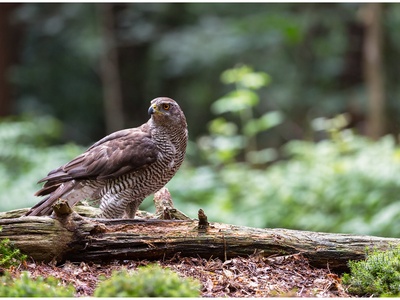
Northern Goshawk
A large, powerful, and fierce woodland hawk. Adults are slate-grey above and finely barred grey-and-white below, with a prominent white eyebrow stripe and a fiery red eye. It is a formidable hunter of birds and mammals within its forest territory.
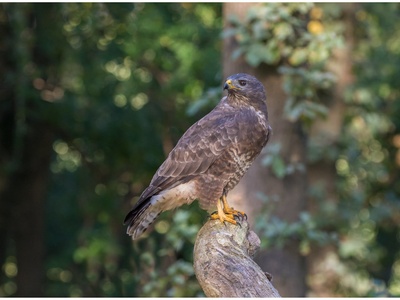
Common Buzzard
The most common large raptor in Romania. A medium-sized, stocky bird of prey with broad wings and a short, fanned tail. Its plumage is highly variable, from dark brown to very pale, but its mewing call is a familiar sound everywhere.
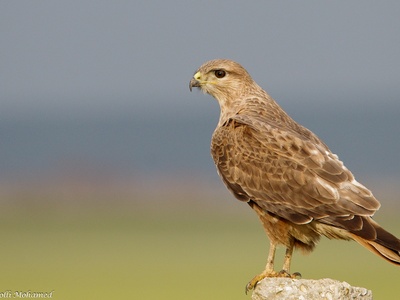
Long-legged Buzzard
A large, eagle-like buzzard of open, arid country. Typically has a pale head and breast, a rufous-orange tail, and often shows dark carpal patches on the underwing. It is a characteristic raptor of the dry landscapes of Dobrogea.
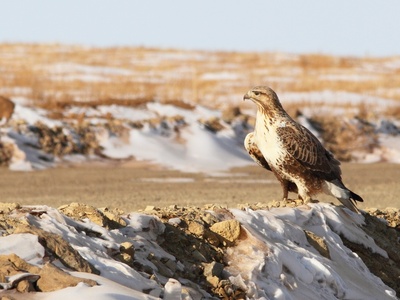
Rough-legged Buzzard
A winter visitor from the Arctic tundra. It is similar in size to the Common Buzzard but has feathered legs (tarsi), a dark belly patch, and a white tail with a broad black terminal band. Often seen hovering over open fields.
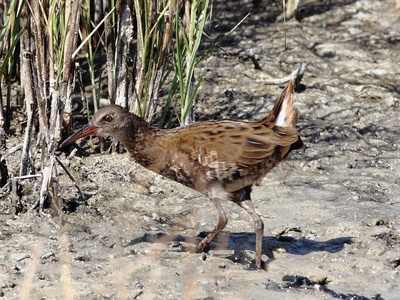
Water Rail
A very secretive bird of the wetlands, heard far more often than seen. It has a long, reddish bill, olive-brown upperparts, and slate-grey face and underparts with barred flanks. Its strange calls, like a squealing pig, give away its presence.
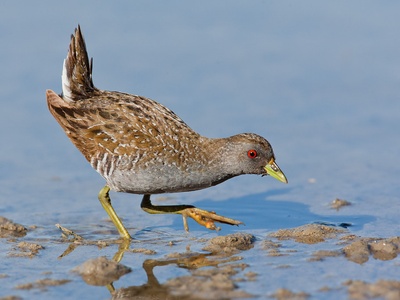
Spotted Crake
A small, secretive rail, olive-brown and covered with white spots and flecks. It has a short, yellowish bill with a red base. It is a shy inhabitant of marshy vegetation, and its whip-crack “whitt, whitt” call is often the only sign of its presence.
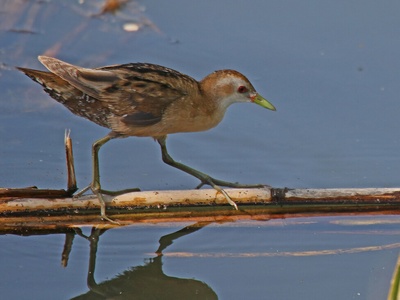
Little Crake
A tiny, elusive rail. The male has a plain slate-grey face and underparts, while the female is buff-coloured. Both have a green bill with a red base. It is incredibly difficult to see as it moves stealthily through dense reedbeds.
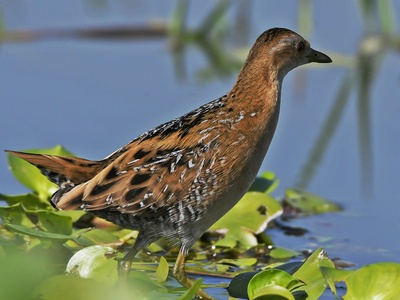
Baillon’s Crake
Even smaller and rarer than the Little Crake. It is distinguished by its barred flanks that extend further towards the front, a shorter bill, and a different call. A very difficult species to find and confirm, requiring patience and luck.
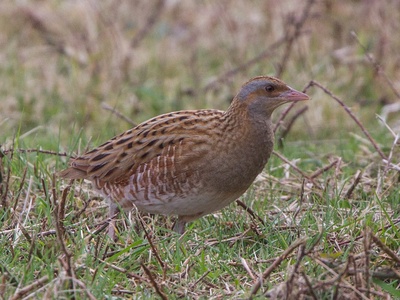
Corn Crake
A secretive, ground-dwelling rail known for its loud, rasping, mechanical “kerrx-kerrx” call, often heard throughout the night. It lives in tall grass and is threatened by early mowing of hay meadows. Its populations are a high conservation concern.
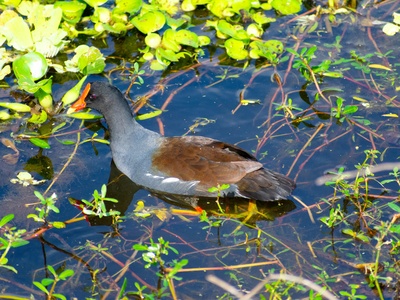
Common Moorhen
A familiar waterbird, dark with a white line along its flank, a red bill with a yellow tip, and a red frontal shield. It flicks its white undertail as it walks or swims and has a variety of clucking and explosive calls.
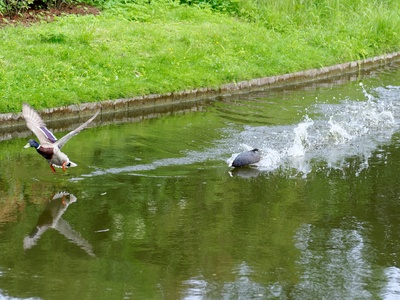
Eurasian Coot
A plump, black waterbird with a distinctive white bill and frontal shield. It can be aggressive and noisy, often seen squabbling on the water. In winter, huge flocks, or “rafts,” can gather on large lakes and reservoirs.
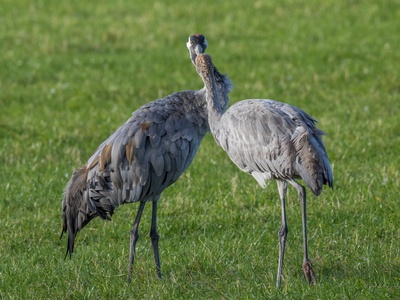
Common Crane
A huge, elegant grey bird with a red patch on its crown and a “bustle” of drooping feathers at its rear. Its bugling calls are a spectacular feature of spring and autumn migration, when thousands pass through Romania. A few pairs have recently begun breeding.
